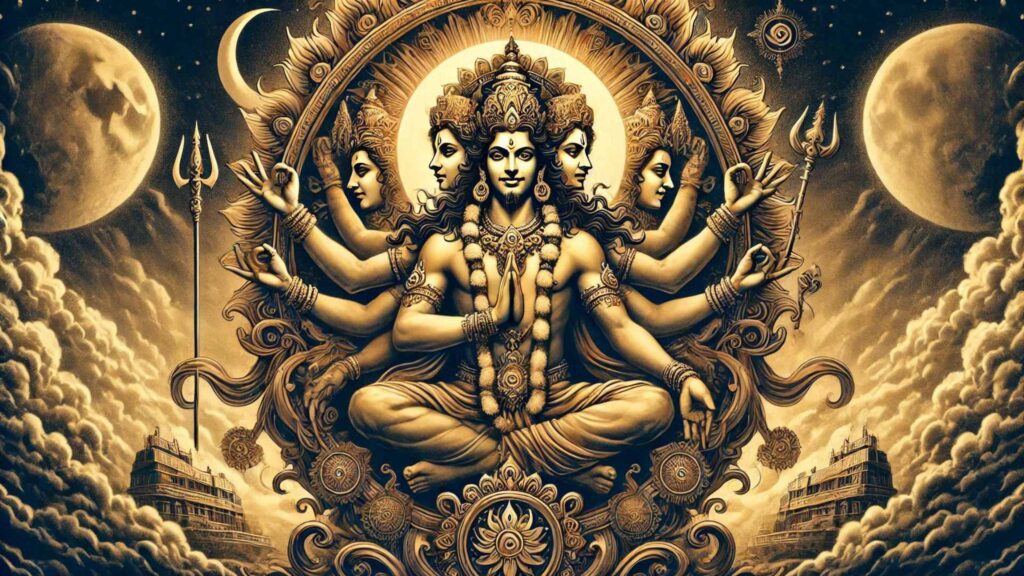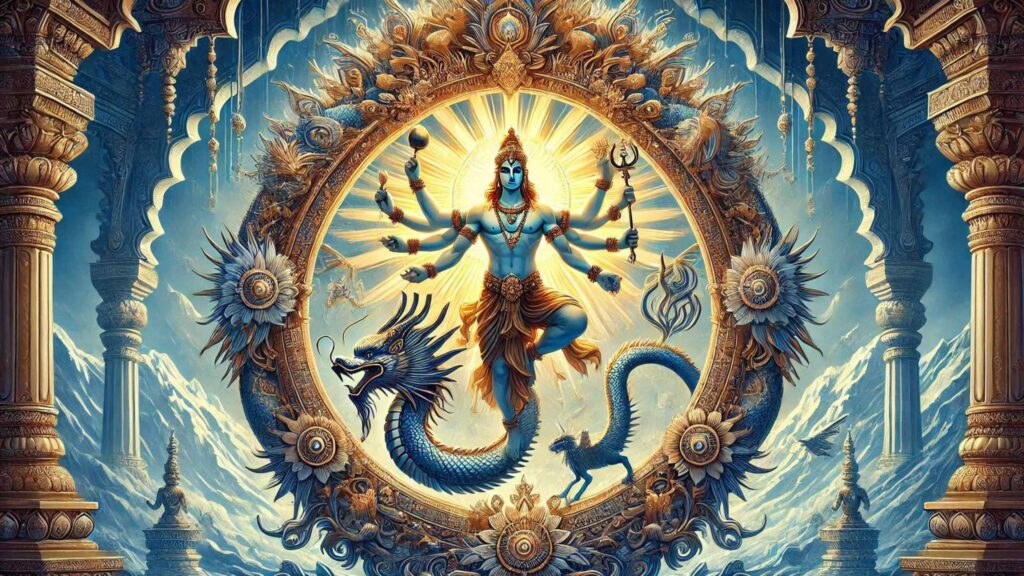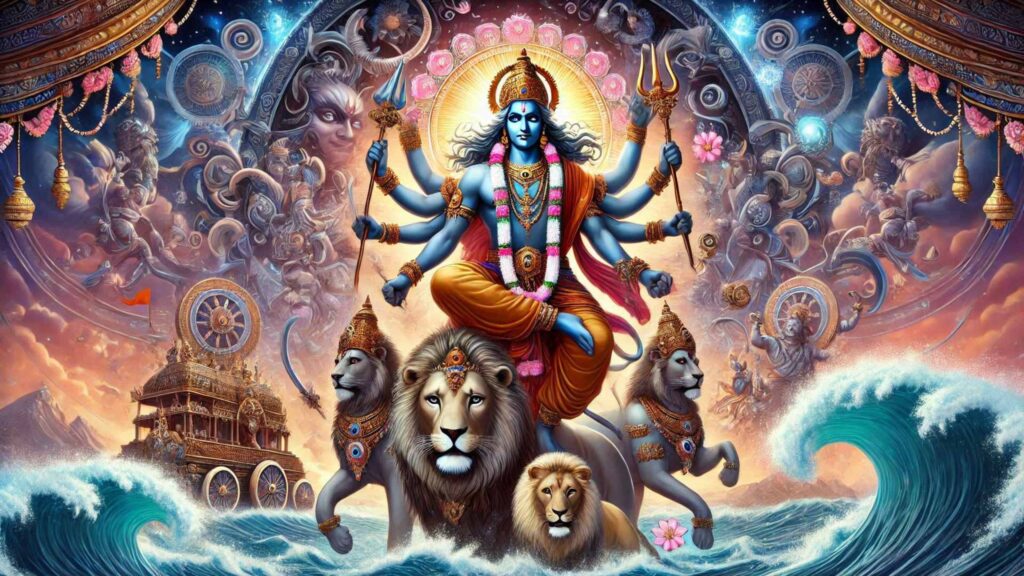Kalki: The Prophesied Warrior Avatar in Hinduism
Introduction
Kalki, the tenth and final avatar of Lord Vishnu in Hinduism, is prophesied to appear at the end of the current age, Kali Yuga. As a harbinger of cosmic balance, Kalki is destined to destroy evil, restore dharma (righteousness), and initiate a new era, Satya Yuga. Depicted as a warrior on a white horse wielding a blazing sword, Kalki embodies hope, justice, and transformation. This deity holds profound cosmic and spiritual significance, symbolizing the ultimate triumph of good over evil.
Read More About Deities And Gods
Significance of Kalki in Daily Hindu Life
Kalki inspires faith in the eventual restoration of justice and morality. His prophecy serves as a moral compass, reminding individuals to uphold righteousness despite adversity. Many devotees invoke Kalki as a source of strength and perseverance, trusting in divine intervention to end societal corruption and chaos.
The Cosmic and Spiritual Importance of Kalki
Kalki represents the cyclical nature of time and the eternal battle between good and evil. He is seen as the force that ends the darkness of Kali Yuga and ushers in a period of enlightenment. Spiritually, Kalki symbolizes transformation, the destruction of ignorance, and the renewal of spiritual consciousness.
Names and Etymology

Meaning of Kalki
The name Kalki derives from the Sanskrit word Kalka, meaning “impurity” or “dirt.” Kalki, therefore, signifies the destroyer of impurity and the purifier of existence.
Other Names and Their Significance
- Kalkin: Refers to his identity as the remover of darkness and ignorance.
- Mahaprabhu: Denotes his supreme divinity and universal leadership.
- Nishkalank: Meaning “the spotless one,” emphasizing his purity and moral superiority.
- Avyaya: Highlights his eternal and unchanging nature.
Each name of Kalki reflects his cosmic role as the purifier, protector, and ultimate restorer of dharma.
Symbolism and Iconography

Physical Description and Symbolism
- White Horse (Devadatta): Symbolizes purity, speed, and divine intervention.
- Blazing Sword: Represents the destruction of evil and the power of divine justice.
- Radiant Form: Kalki is often depicted as luminous, symbolizing enlightenment and spiritual awakening.
- Crown and Armor: Indicate his role as a warrior king and protector of dharma.
Flower Connection
White flowers, particularly jasmine, are associated with Kalki, symbolizing purity and renewal.
Colors and Symbols
- White: Represents purity, divine intervention, and the start of a new cycle.
- Golden Sword: Symbolizes unyielding justice and moral strength.
Mythology and Stories

Birth Story
Kalki is foretold to be born in the village of Shambhala to a virtuous Brahmin family. His parents, Vishnuyasha and Sumati, are said to be devout and chosen by divine will. His birth signifies the divine response to humanity’s moral decline in the Kali Yuga.
Kalki and His Divine Mission
Kalki’s mission is to eliminate the wicked and re-establish righteousness. Riding his white horse and wielding his sword, he is said to engage in a cosmic battle, vanquishing evil forces and restoring balance.
Connection with Other Deities
As an avatar of Lord Vishnu, Kalki is closely connected to his previous incarnations:
- Rama: Shares the commitment to uphold dharma.
- Krishna: Mirrors his role in addressing cosmic imbalance during times of moral decay.
Role in Ramayana and Mahabharata
While Kalki does not directly appear in these epics, the philosophy of his avatar aligns with the dharmic principles emphasized in both texts. His prophecy resonates with the Bhagavad Gita’s teachings on divine intervention in times of crisis.
Famous Blessings and Boons
Kalki is prophesied to bless humanity with:
- A new era of peace and prosperity.
- Liberation from evil forces.
- Restoration of dharma and spiritual harmony.
Spiritual Significance
A Visible Form of God
Kalki represents the ultimate manifestation of divine justice. He embodies the active intervention of the divine in human affairs to restore cosmic balance.
Representation of Knowledge and Enlightenment
Kalki symbolizes the victory of knowledge over ignorance and light over darkness. His arrival signifies the end of spiritual complacency and the dawn of higher consciousness.
Role in Yoga and Meditation
Kalki’s energy is invoked in meditative practices to overcome inner negativity and foster transformative spiritual growth.
The Mantra Connection
Mantras dedicated to Kalki include:
- “Om Kalkine Namah”: Invokes his blessings for purity and justice.
- “Om Shri Kalkiaya Namah”: Praises his role as the destroyer of evil.
Worship and Rituals
Benefits of Worship
Worshiping Kalki instills hope, courage, and moral strength. Devotees seek his blessings for overcoming personal and societal challenges.
Daily Worship Practices
- Chanting his mantras.
- Offering white flowers and lighting a lamp.
- Reading sacred texts that mention Kalki, like the Vishnu Purana.
Best Times for Worship
- Ekadashi: A sacred day for Vishnu worship, ideal for honoring Kalki.
- Kali Yuga-specific festivals: Periodic rituals dedicated to Kalki’s anticipated arrival.
Important Festivals
While there are no exclusive festivals for Kalki currently, devotees celebrate him during Vishnu-centric festivals like Janmashtami and Vaikuntha Ekadashi.
List of Famous Temples
- Kalkaji Temple – Delhi, India
- Shambhala Temple (Mythical) – Representing his prophesied birthplace.
Modern Relevance
Scientific Understanding
Kalki’s prophesied role as a destroyer of impurity resonates with modern concepts of resetting systems to eliminate corruption and inefficiency.
Environmental Consciousness
Kalki’s symbolism emphasizes the need to cleanse the world of environmental degradation and restore balance.
Health Benefits and Energy Connection
Chanting Kalki mantras is believed to:
- Reduce stress and instill mental clarity.
- Promote resilience against challenges.
- Inspire a sense of purpose and moral alignment.
Cultural Impact
Influence on Indian Art and Architecture
Kalki is a recurring theme in temple carvings and traditional paintings, emphasizing his cosmic importance.
Presence in Literature and Poetry
Kalki’s prophecy inspires literary works focusing on moral decay and divine justice.
Impact on Daily Customs
The anticipation of Kalki’s arrival influences customs promoting purity, righteousness, and spiritual vigilance.
Regional Variations in Worship
Kalki worship varies across regions, often integrated with Vishnu-centric traditions.
Practical Applications
Morning Prayers and Rituals
- Reciting Kalki mantras during sunrise aligns the devotee with purity and transformative energy.
Astrological Significance
Kalki is associated with Jupiter, symbolizing wisdom, expansion, and justice.
Gemstones and Metals
- White Sapphire: Enhances purity and clarity.
- Gold: Symbolizes divine connection and energy.
Conclusion
Kalki, the warrior avatar, serves as a beacon of hope and transformation in Hinduism. His prophecy reminds humanity of the cyclical nature of time and the eventual triumph of good over evil. By invoking Kalki, devotees embrace the divine qualities of justice, purity, and renewal, paving the way for personal and societal growth.


